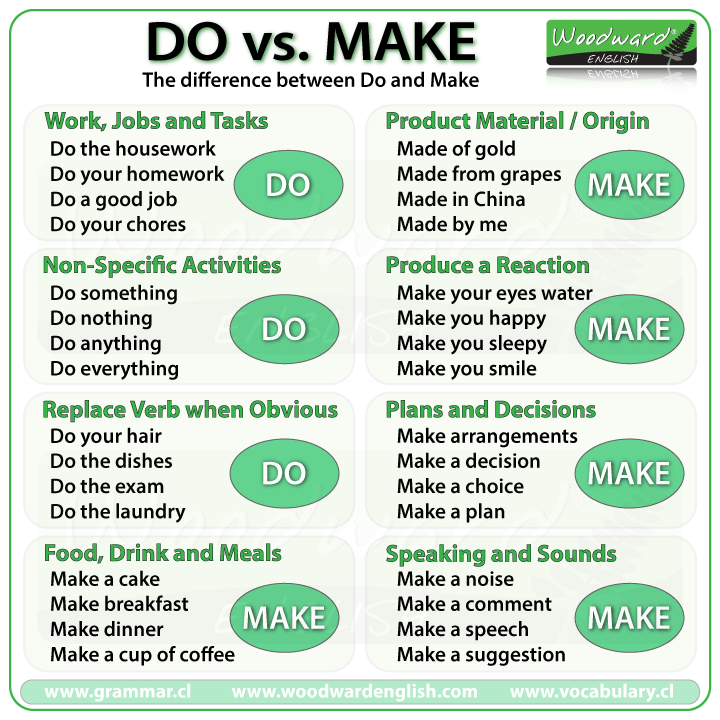суббота, 30 октября 2021 г.
среда, 27 октября 2021 г.
среда, 20 октября 2021 г.
вторник, 12 октября 2021 г.
Do and Make are two verbs which frequently confuse students. Here we will learn about the difference between Do and Make and when to use each one.
When do you use DO?
DO is used as follows:
1. DO is used when talking about work, jobs or tasks. Note, they do not produce any physical object.
- Have you done your homework?
- I have guests visiting tonight so I should start doing the housework now.
- I wouldn't like to do that job.
2. DO is used when we refer to activities in general without being specific. In these cases, we normally use words like thing, something, nothing, anything, everything etc.
- Hurry up! I've got things to do!
- Don't just stand there – do something!
- Is there anything I can do to help you?
3. We sometimes use DO to replace a verb when the meaning is clear or obvious. This is more common in informal spoken English:
- Do I need to do my hair? (do = brush or comb)
- Have you done the dishes yet? (done = washed)
- I'll do the kitchen if you do the lawns (do = clean, do = mow)
Remember Do can also be as an auxiliary verb (for making questions in the present tense - Do you like chocolate?)
When do you use MAKE?
Make is for producing, constructing, creating or building something new.
It is also used to indicate the origin of a product or the materials that are used to make something.
- His wedding ring is made of gold.
- The house was made of adobe.
- Wine is made from grapes.
- The watches were made in Switzerland
We also use Make for producing an action or reaction:
- Onions make your eyes water.
- You make me happy.
- It’s not my fault. My brother made me do it!
You make before certain nouns about plans and decisions:
- He has made arrangements to finish work early.
- They're making plans for the weekend.
- You need to make a decision right now.
We use Make with nouns about speaking and certain sounds:
- She made a nice comment about my dress.
- The baby is asleep so don't make any noise.
- Can I use your phone to make a call?
- Don't make a promise that you cannot keep.
We use Make with Food, Drink and Meals:
- I made a cake for her birthday.
- She made a cup of tea.
- I must go now. I have to make dinner.
Compare Do and Make
A: You have to make a cake for Simon.
B: I’ll do it later.
Notice how in the response the verb DO is used. This is because the meaning is clear and to avoid saying “I’ll make it later.” which could sound repetitive.
Do vs. Make Comparison Chart

Common Expressions with Do and Make
The following expressions are set collocations (combinations of words that frequently appear together) that you need to learn:
Expressions with DO
The following words are normally used with Do:
- a burp
- a course
- a crossword
- a dance
- a drawing
- a fart
- a favor / favour
- a job
- a painting
- a project
- a service
- an assignment
- anything
- badly
- business
- chores
- damage
- everything
- exercises
- good
- harm
- nothing
- research
- right (the right thing)
- something
- the dishes
- the gardening
- the housework
- the ironing
- the laundry
- the rest
- the shopping
- the washing
- well
- work
- wrong (the wrong thing)
- your best
- your hair
- your homework
- your job
- your nails
- your work
Expressions with MAKE
The following words are normally used with MAKE:
- a bet
- a cake
- a call
- a change
- a choice
- a comment
- a complaint
- a confession
- a connection
- a cup of coffee / tea
- a date
- a decision
- a demand
- a difference
- a discovery
- a face
- a fool of yourself
- a fortune
- a friend
- a fuss
- a joke
- a line
- a list
- a living
- a loss
- a mess
- a mistake
- a noise
- a pass at someone
- a phone call
- a plan
- a point
- a prediction
- a profit
- a promise
- a reservation
- a sandwich
- a scene
- a sound
- a speech
- a statement
- a suggestion
- advances
- alterations
- an appointment
- an announcement
- an attempt
- an effort
- an error
- an escape
- an exception
- an excuse
- an impression
- an observation
- an offer
- amends
- arrangements
- breakfast
- certain
- clear
- dinner
- faces
- famous
- fun of someone
- love
- lunch
- inquiries
- peace
- possible
- progress
- money
- room
- sales
- sense
- someone rich
- someone smile
- sure
- trouble
- war
- your bed
- your mind up
- your way

